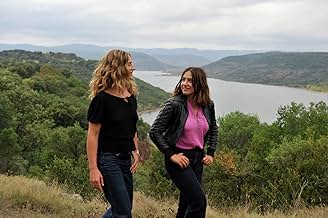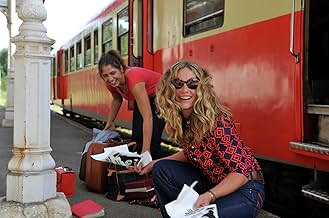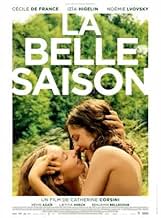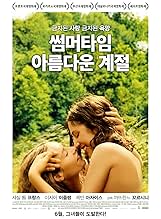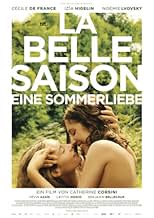CALIFICACIÓN DE IMDb
6.7/10
6.1 k
TU CALIFICACIÓN
Francia, años 70. Una joven de campo se muda a Paris en busca de independencia, al llegar se verá envuelta en una apasionante relación con una mujer muy involucrada en los inicios del movimi... Leer todoFrancia, años 70. Una joven de campo se muda a Paris en busca de independencia, al llegar se verá envuelta en una apasionante relación con una mujer muy involucrada en los inicios del movimiento feminista.Francia, años 70. Una joven de campo se muda a Paris en busca de independencia, al llegar se verá envuelta en una apasionante relación con una mujer muy involucrada en los inicios del movimiento feminista.
- Dirección
- Guionistas
- Elenco
- Premios
- 3 premios ganados y 8 nominaciones en total
Cécile de France
- Carole
- (as Cécile De France)
Natalie Beder
- Marie-Laure
- (as Nathalie Beder)
- Dirección
- Guionistas
- Todo el elenco y el equipo
- Producción, taquilla y más en IMDbPro
Opiniones destacadas
Watching this film in the start of 'pride month.'
Summertime is an engaging love story in the 70's. This is a very sensitive portrayal of two women from different backgrounds in conservative, rural France. Set in the early 70s in the first flush of modern feminism, the plot is pretty simple and the issue simpler - will they stay together against the pressures of rural society? The film is very realistic as it deals with woman rights and also portrays the societal views on lesbian culture in the 70's. This is a very good representation of LGBTQ in the films.
As I was watching this film, I was very much reminded of another French film, "Blue is the Warmest Colour" which also deals with similar theme of lesbianism. I really love 'Blue is the Warmest Colour' and is my favourite romance film. However, this film is also a good film with good themes and lesbian representation. This film shows how it is to be a lesbian in a rural France in the 70's, how the society thinks of a girl involving with another girl.
Overall, it's a pretty good film which portrays a really interesting subject matter.
As I was watching this film, I was very much reminded of another French film, "Blue is the Warmest Colour" which also deals with similar theme of lesbianism. I really love 'Blue is the Warmest Colour' and is my favourite romance film. However, this film is also a good film with good themes and lesbian representation. This film shows how it is to be a lesbian in a rural France in the 70's, how the society thinks of a girl involving with another girl.
Overall, it's a pretty good film which portrays a really interesting subject matter.
When you watch this feature, you think of LA VIE D'ADELE, speaking of the same scheme, female homosexuality. This film is gripping at the most, telling us the story of two Young women who met in Paris during the early seventies, when the feminist movements spread all over the world. And don't forget that two years ago, in France, the marriage for everyone laws were on every lip. So it remains in the line of actuality. Cecile de France is terrific here, so is Noémie Chowsky, as the mother of one of the two women in love for each other. A human drama that grabs you from the start to the end. I highly recommend it. Catherine Corsini made here an outstanding piece of work.
The film, set in 1971, tells the story of the lesbian relationship between Delphine, a farmer's daughter, and Carole, a feminist activist, who meet when Delphine moves to Paris. This does not, however, mean that Delphine is an innocent country girl seduced by the more sophisticated Parisian older woman. It is the exclusively lesbian Delphine who is more experienced than the bisexual Carole- indeed, Carole's previous relationships have all been with men, and she has a boyfriend at the time when she meets Delphine.
Things change when Delphine's father Maurice has a stroke and Delphine, an only child, is forced to return to help her mother Monique run the farm. Carole follows her, but they quickly realise that pursuing their relationship in the countryside will not be easy. In the cosmopolitan atmosphere of Paris, at least in the radical circles in which Carole and Delphine move, lesbianism is widely accepted. In "La France Profonde" it is not. Delphine's parents have no idea that she is a lesbian, although some people in the area are beginning to suspect, and they believe that she will marry Antoine, a local boy who is interested in her.
The climax of the film comes when Monique finds Delphine and Carole in bed together. Believing that the older woman has corrupted her daughter, Monique angrily orders Carole to leave her house and never return. Delphine must decide where her future lies. This is not simply a question of deciding between her love for Carole and her loyalty to her family. Delphine has also realised that she loves the countryside, rural traditions and the life of the farm. She therefore also has to decide between her love for Carole and the profession and lifestyle in which she feels most comfortable. I won't give away the ending by revealing which choice she makes.
The film was shown in Britain as "Summertime", but I prefer the original French title "La Belle Saison", partly to avoid confusion with the David Lean film from 1955 with Katharine Hepburn, partly because it seems to me to have more layers of meaning. The romance between Delphine and Carole can be seen as the "beautiful season" of their lives; perhaps the so-called "sexual revolution" of the late sixties and early seventies also seemed like a "beautiful season" to those who lived through it.
Being a heterosexual British male, I am probably not the demographic at which a French lesbian-feminist film is aimed, but I must say that I enjoyed "La Belle Saison". When you can see past some of its preaching, especially on the abortion issue, it emerges as a very good film. Both the lead actresses, Cécile de France and Izïa Higelin, play their parts very well, and the attractive photography of the French countryside- it was shot in the Limousin- give it something of the look of a British "heritage cinema" drama. The period angle reminds us that the past- even the relatively recent past within my own lifetime- is (as L P Hartley said) another country where they do things differently. One likes to think that fifty years on things would be easier for Delphine and Carole than they were in 1971. Perhaps in France, even rural France, they would be, but in some parts of the world I am not so sure. The film reminded me of a recent British film, "Tell It to the Bees", another period drama (in that case set in the fifties) about a lesbian couple confronted with a difficult life choice. Like that film, "La Belle Saison" is a sensitively made, well-acted human drama and a plea for tolerance. 7/10.
Things change when Delphine's father Maurice has a stroke and Delphine, an only child, is forced to return to help her mother Monique run the farm. Carole follows her, but they quickly realise that pursuing their relationship in the countryside will not be easy. In the cosmopolitan atmosphere of Paris, at least in the radical circles in which Carole and Delphine move, lesbianism is widely accepted. In "La France Profonde" it is not. Delphine's parents have no idea that she is a lesbian, although some people in the area are beginning to suspect, and they believe that she will marry Antoine, a local boy who is interested in her.
The climax of the film comes when Monique finds Delphine and Carole in bed together. Believing that the older woman has corrupted her daughter, Monique angrily orders Carole to leave her house and never return. Delphine must decide where her future lies. This is not simply a question of deciding between her love for Carole and her loyalty to her family. Delphine has also realised that she loves the countryside, rural traditions and the life of the farm. She therefore also has to decide between her love for Carole and the profession and lifestyle in which she feels most comfortable. I won't give away the ending by revealing which choice she makes.
The film was shown in Britain as "Summertime", but I prefer the original French title "La Belle Saison", partly to avoid confusion with the David Lean film from 1955 with Katharine Hepburn, partly because it seems to me to have more layers of meaning. The romance between Delphine and Carole can be seen as the "beautiful season" of their lives; perhaps the so-called "sexual revolution" of the late sixties and early seventies also seemed like a "beautiful season" to those who lived through it.
Being a heterosexual British male, I am probably not the demographic at which a French lesbian-feminist film is aimed, but I must say that I enjoyed "La Belle Saison". When you can see past some of its preaching, especially on the abortion issue, it emerges as a very good film. Both the lead actresses, Cécile de France and Izïa Higelin, play their parts very well, and the attractive photography of the French countryside- it was shot in the Limousin- give it something of the look of a British "heritage cinema" drama. The period angle reminds us that the past- even the relatively recent past within my own lifetime- is (as L P Hartley said) another country where they do things differently. One likes to think that fifty years on things would be easier for Delphine and Carole than they were in 1971. Perhaps in France, even rural France, they would be, but in some parts of the world I am not so sure. The film reminded me of a recent British film, "Tell It to the Bees", another period drama (in that case set in the fifties) about a lesbian couple confronted with a difficult life choice. Like that film, "La Belle Saison" is a sensitively made, well-acted human drama and a plea for tolerance. 7/10.
I didn't much care for the first half of 'Summertime': a posse of beautiful, self-confident and middle-class young feminists assert their right to "to as they please" in the Paris of the 1970s. What is absent from the portrayal is any sense of the personal insecurity that cripples most of us; these sisters, it seems, can quite literally do anything for themselves. The film becomes more nuanced when it follows two of its protagonists (a lesbian couple) back to the farm in the country where one of them (Delphine) grew up, and whence she has now been summoned owing to the illness of her father. There's still some idealisation here: the family own their farm and live a simple peasant life. But the conflict between Delphine's familial and spatial sense of identity, and the new relationship she has forged in the city, is nicely portrayed, as is the guarded hostility of her mother and her local acquaintances to the choices she has made in her new life. Overall, it's not nearly as strong as 'Blue is the Warmest Colour', but it grew on me as I watched it.
It's 1971 France. Delphine Benchiessa (Izïa Higelin) works at her family's rural farm. Her father berates her for being too slow to find a man. Unbeknownst to him, she's a lesbian. Her girlfriend surprises her by marrying a local boy. In Paris, she gets caught up with a group of militant feminists. She falls for their leader Carole (Cécile de France). After her father suffers a stroke, Delphine is forced to go home and take care of the farm.
It's another version of the tragic lesbian love story. I do wonder if 1971 France is a little too late to have this story. Usually, it's Victorian ladies on a gravel beach trying to discover lesbianism. In reality, rural conservatism and family dynamics do account for it. These ladies are not ignorant of the world. The 70's is not all disco and gay. It's still a fight for rights and acceptance. The danger isn't as high, and the story becomes smaller. Delphine could always run off and abandon the farm. It's not like society prevents her from getting a job in Paris. The issue becomes more internal and personal. It's a relationship movie.
It's another version of the tragic lesbian love story. I do wonder if 1971 France is a little too late to have this story. Usually, it's Victorian ladies on a gravel beach trying to discover lesbianism. In reality, rural conservatism and family dynamics do account for it. These ladies are not ignorant of the world. The 70's is not all disco and gay. It's still a fight for rights and acceptance. The danger isn't as high, and the story becomes smaller. Delphine could always run off and abandon the farm. It's not like society prevents her from getting a job in Paris. The issue becomes more internal and personal. It's a relationship movie.
¿Sabías que…?
- TriviaDirector Catherine Corsini stated that she named the two main characters Carole and Delphine after real life artists and feminists Carole Roussopoulos and Delphine Seyrig.
- ErroresAfter a swim in the pond, the girls lay out to take some sun. As Carole lays naked on the blanket resting her head on Delphine, her arms are raised and we can see she does not have any underarm hair. As the girls start to kiss and caress Carole's armpit is exposed again but this time full of underarm hair.
- ConexionesReferenced in Théo et Hugo dans le même bateau (2016)
- Bandas sonorasL'Hymne du MLF, d'apres Le Chant des Marais
(Johann Esser/Wolfgang Langhoff/Rudi Goguel)
With the kind permission of Edition Peters Group
All rights reserved
Selecciones populares
Inicia sesión para calificar y agrega a la lista de videos para obtener recomendaciones personalizadas
- How long is Summertime?Con tecnología de Alexa
Detalles
- Fecha de lanzamiento
- Países de origen
- Sitio oficial
- Idiomas
- También se conoce como
- Summertime
- Locaciones de filmación
- Haute-Vienne, Francia(scenes in the country)
- Productoras
- Ver más créditos de la compañía en IMDbPro
Taquilla
- Presupuesto
- EUR 4,800,000 (estimado)
- Total en EE. UU. y Canadá
- USD 35,322
- Fin de semana de estreno en EE. UU. y Canadá
- USD 15,413
- 24 jul 2016
- Total a nivel mundial
- USD 3,778,938
Contribuir a esta página
Sugiere una edición o agrega el contenido que falta

![Ver Bande-annonce [OV]](https://m.media-amazon.com/images/M/MV5BMzZiZTVkNWItZGNjYS00ZDY2LWFkOGItZjhkNTk2NDQ3ZDE2XkEyXkFqcGdeQXRyYW5zY29kZS13b3JrZmxvdw@@._V1_QL75_UX500_CR0)


